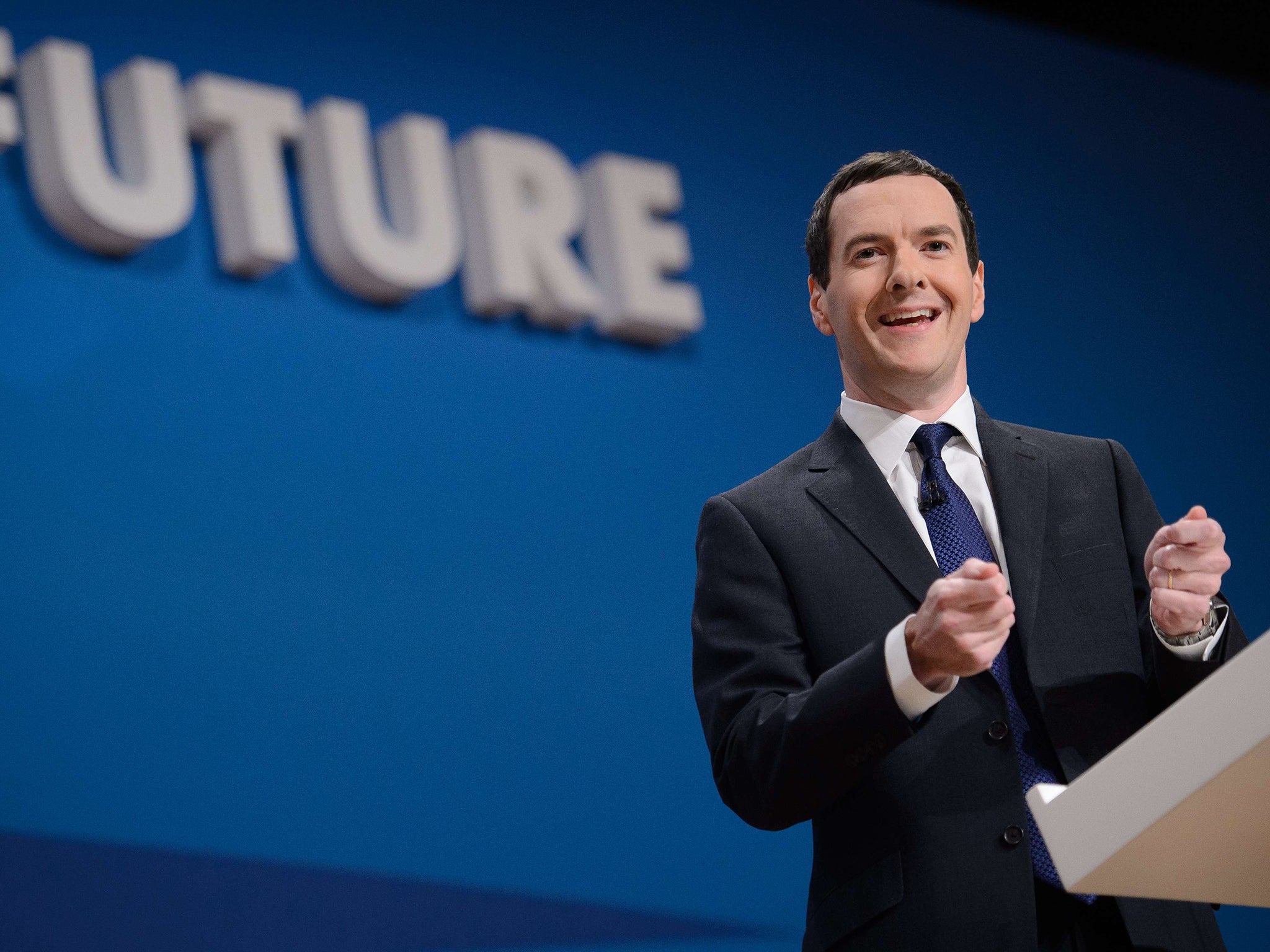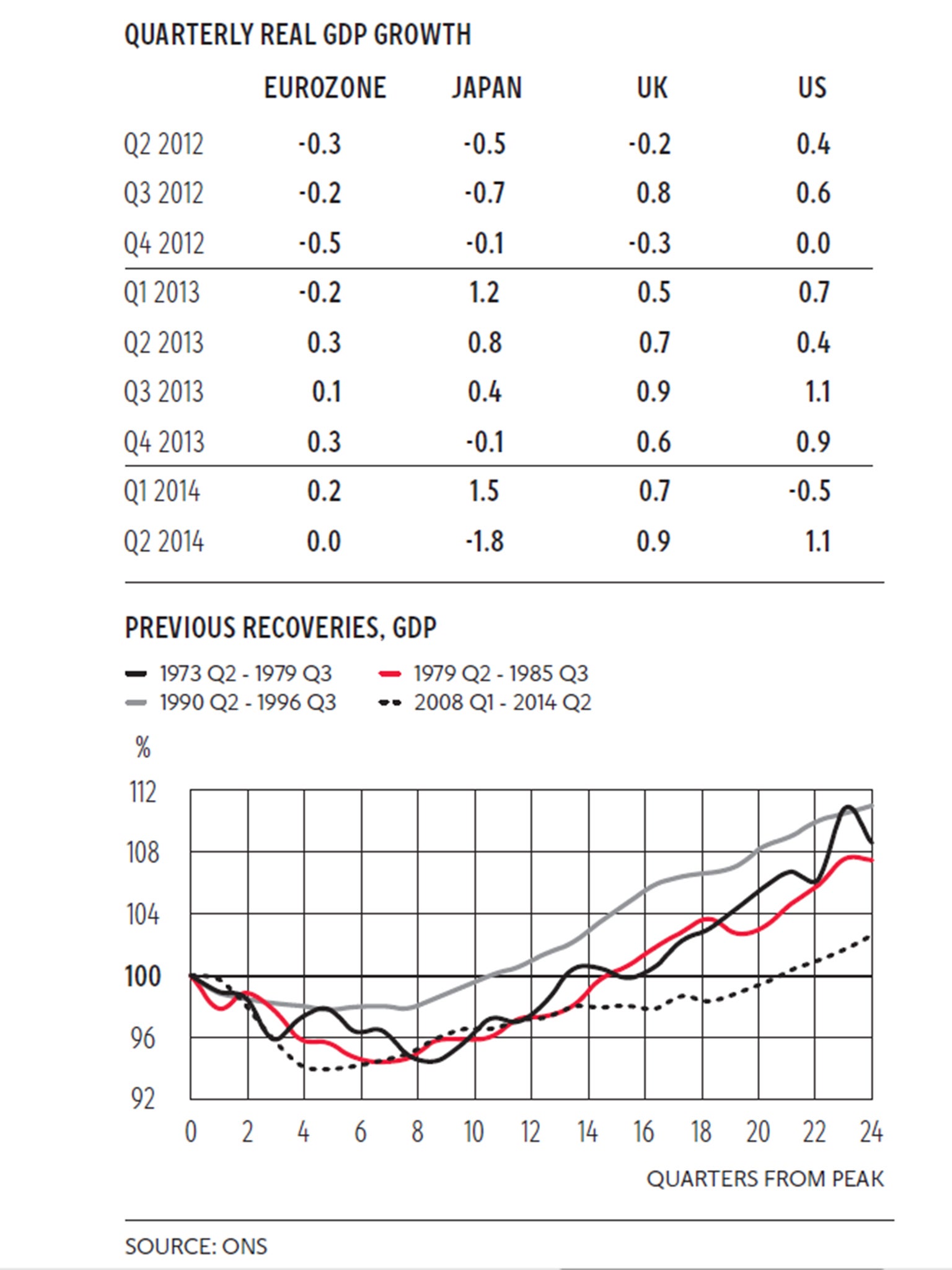Sorry, George, but simply cutting the benefits of the poor is not going to make them work harder
Britain is not the fastest-growing, most job-creating, deficit-reducing, of any major advanced economy

James Carville, Bill Clinton’s campaign strategist, coined the phrase “It’s the economy, stupid”. We had a much less memorable variant on the theme last week at the Tory party conference. George Osborne, the Chancellor of the Exchequer, in his speech offered the following little gem: “It’s the economy that builds houses. It’s the economy that creates jobs. It’s the economy that pays for hospitals. It’s the economy that puts food on the table.” Wow! Honestly, I still can’t make head or tail of this. I promise you, he really did say it!
The economy doesn’t do anything. It is just the sum of people and businesses and how they interact together. Construction workers build houses. Companies create jobs. Taxpayers pay for hospitals. Workers put food on the table. I am going to get the economy to take my dog for a walk, wash my clothes, do the ironing and drive me to the office. I wonder if the economy supports Arsenal or Man United? We deserve better.
There were more pearls of wisdom, and bucketloads of spin, half-truths and obfuscation. “The economy … it means everything to the people of Britain. It means our security, and whether we pay our bills and provide for our families.” What people can buy with their income matters, but the economy doesn’t pay the bills or provide for the kids. Twaddle and drivel.
“Today I can report this to you: Britain is the fastest-growing, most job-creating, deficit-reducing … of any major advanced economy on Earth.”
Really? The first chart shows the quarterly growth rates for the eurozone, Japan, the UK and the US. The UK grew 0.9 per cent in the past quarter, compared with the recently revised 1.1 per cent for the same quarter in the United States. Admittedly the UK did grow faster than the US over the past four quarters (3.1 per cent versus 2.5 per cent) but the reverse is the case over the period Q2 2012 to Q2 2014 (4.6 per cent versus 4.7 per cent).

In addition, in the latest data we have available, from April to June 2014, employment in the UK fell by 34,000; in the US, payroll employment rose by 500,000 over the same period. The US budget deficit is down 60 per cent from its peak in 2009, whereas according to George Osborne, the budget deficit in the UK is “approaching half what it was when we came to office”. Britain is not the fastest-growing, most job-creating, deficit-reducing, of any major advanced economy.
The latest data release from the ONS did revise the growth data up for the UK, as shown in the second chart, but that doesn’t let Mr Osborne off the hook. The cumulative decline in output between Q1 2008 and Q2 2009, previously estimated at 7.2 per cent, now stands at 6 per cent. The revisions suggest the UK economy experienced a slightly shallower contraction in output during the downturn and a slightly stronger recovery in subsequent periods, including under Labour through to May 2010. And real GDP per capita remains 1.8 per cent below its starting level.
Output today is about 2.7 per cent above where it was at the start of 2008, but the recovery is still the slowest in living memory. It took 21 quarters, from the start of the recession in Q1 2008, for output to be restored to its starting level.
The economy flatlined under Mr Osborne in 2011 and 2012, growing 1.6 per cent and 0.7 per cent, respectively, and grew 1.7 per cent in 2013, down from 1.9 per cent in 2010. This contrasts with the forecasts the OBR made in the June 2010 Budget of 1.2 per cent in 2010, 2.3 per cent in 2011, 2.8 per cent in 2012 and 2.9 per cent in 2013. Mr Osborne has been an economic disaster.
“There is a fashionable claim made these days – a claim that the link between the prosperity of the national economy, and the prosperity of the people who live in that economy has been broken. I want to take that head-on because it is a dangerous fallacy” he said in his speech.
Even though there has been a recovery in output, since May 2010 real earnings have fallen 10 per cent and are currently falling at a 1.8 per cent annual rate. Fashionable, maybe, but also right, I would say. I see no fallacy, dangerous or otherwise.
Then there was all the stuff that assumed that the poor work harder if you pay them less and the rich work harder if you pay them more. Tax cuts for the rich, £25bn in spending cuts and a two-year freeze on welfare benefits that will hit the poorest third in society hardest. The poor don’t have a nice pension pot to pass on to their heirs. The disabled and pensioners and anyone who might vote Tory are excluded from any pain. The public-sector pay freeze is to be extended through 2017.
“Let’s abolish long-term youth unemployment altogether,” says Mr Osborne, and I concur. But giving six months for unemployed youngsters to find work or training before their jobseekers’ allowance is withdrawn won’t do it.
Mr Osborne appears to assume that unemployment is voluntary, despite evidence to the contrary, for the young and the old. Data published by the ONS last week on wellbeing makes this clear. Respondents were asked how happy they were, on a scale of one to 10, with 10 being the happiest. The patterns in the data are well-known in the literature: the unemployed are really unhappy. If they chose to be unemployed you would have thought they would be happy. On average the happiness score is 7.4. Full-time employees, students, the retired and homemakers all have scores of 7.4 or higher. The disabled score 5.7 and the temporarily sick score 6. Part-timers who don’t want a full-time job score 7.6, but the under-employed, who are part-time and want a full-time job, score 7.2, and the unemployed score 6.9. The army of the unemployed is a conscript army, not a volunteer army.
Cutting benefits won’t do it for the 200,000 young people under the age of 25 who have been continuously unemployed for more than a year. Or even the remaining 550,000 aged 16-24, who have been unemployed for less than a year. Their problem is there are no jobs. Flogging them and putting them in chains won’t help either.
Join our commenting forum
Join thought-provoking conversations, follow other Independent readers and see their replies
Comments